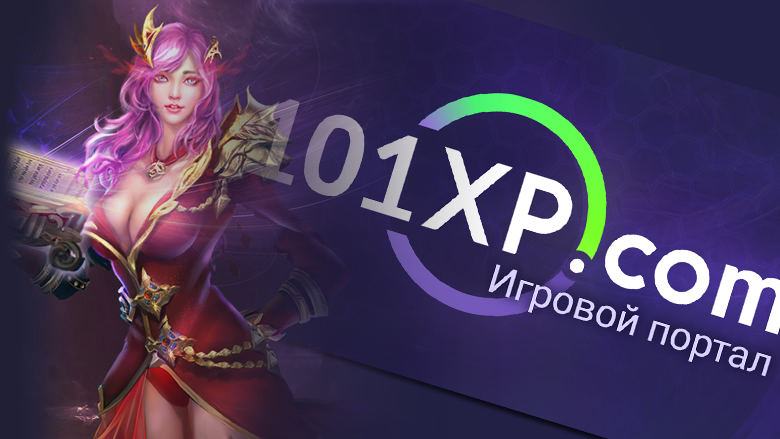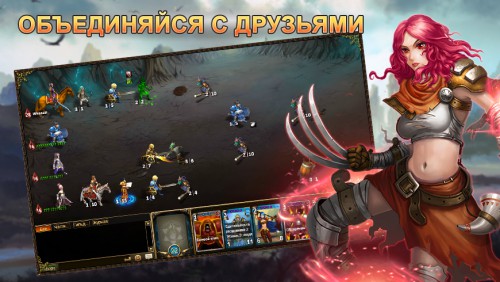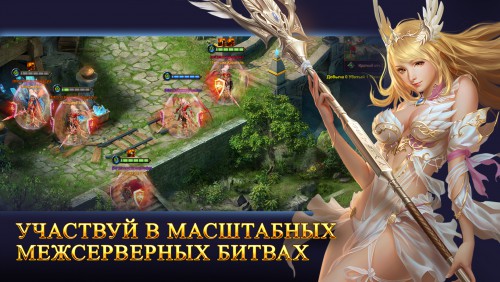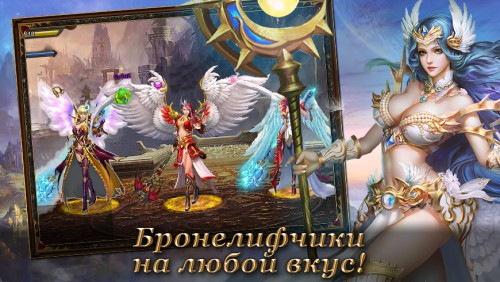About myself, the transfer of Oriental MMO to the Russian market and how to work with Chinese companies, App2 Top.ru told the publisher and localizer of online games 101 XP.

Ilya Salamatov, Head of the 101XP Business Development Department, answered our questions.
Hi! Tell us a little about the company first.
Ilya Salamatov
Hi! Our company turned 6 years old this year. It was 6-7 years ago that it became clear that the retail market was shrinking, everyone started going online. When domestic social networks allowed publishing their applications, a new promising and dynamically developing market appeared. And in 2009, Alex Ruzhentsev, having the experience of bringing titles such as The Witcher, Call of Duty 4, Tomb Raider, Hitman and many others to the market, decided to open his own company.
The 101HR company took its first steps in social networks, then a gaming platform appeared, on which popular browser and client games from China, Korea, and Europe became flagships. Now 101XP games are launched in all major social networks: VK, OK, FB, and on the gaming platform itself they are presented in Russian, English and Polish, with full support for players in these languages 24 hours a day. We have launched and supported more than 30 games, which are played by more than 6 million players every month. In fact, now, on average, 1 game is launched on the portal every two weeks.
How do you work with Eastern companies? So you liked the game, you go to a Chinese developer and say, I want a game? Something else?
If only it were that simple. All the fun begins from the moment you like the game and you want to go to a Chinese or Korean developer. In the Asian market, you still have to manage to find a game developer. And this is not a joke, well, rather, not really a joke. Well, if there is information about the publisher of the game, sometimes there is not.
Here it is necessary to understand the mentality of the same Chinese, in general. I remember how a dentist sold building materials to one of my friends. He made a mistake with the number, asked a question, and he decided not to miss the opportunity to earn: he discussed with him the type, cost, volume, up to the drawing on the wallpaper. He even made an appointment with him, by the time my friend realized that this was not his supplier at all.
It’s the same with games. You contact the publisher in the hope of finding the developer of a wonderful game for girls, a glamorous dance simulator in which you can dance, get acquainted, build and furnish your house, have fun with friends at the spa and go shopping. And the publisher that you came to recently published a game about killer robots. Or he hasn’t published a single game yet, but he will never tell you about it. Even if this company is not a publisher of computer games at all, but produces smartphones, they will not miss the opportunity to earn. They just have to at least try. And it’s not even cheating. They will be looking for a game for you. And in the end, perhaps, they will offer Killer Robots online. When you are violently indignant and fight off the Robots that they are trying to foist on you, they will not be surprised, they will not be upset. If you do not take Robots, the Chinese will perceive this as another step provided by statistics on the way to his financial well-being.
Remember the traveling salesman’s commandment: every door that slams in your face is a minus one more attempt to get to that most cherished buyer who will pay for everything with a vengeance. Well, you didn’t buy Killer Robots and wallpaper in cheerful polka dots, so the next one will buy. The mentality of the Chinese reflects their spiritual and traditional values developed over thousands of years. The Chinese will not even hold a grudge against you. And you can stomp your feet, wave your arms and beat up the total amount of representative expenses for the last 3 months, when you received letters, promises, went on business trips and paid for Peking duck, which was really the most delicious in all of Beijing. So you need to know the Chinese market in detail, understand its structure and have reliable people with whom you have already drunk more than one liter of soy sauce, so that they will lead you to other reliable people, and they will introduce you to the very developer you need. We have spent several years building our network of contacts and countless business trips, visits to exhibitions and meetings, but the key point is still in personal connections.
Gods of War
By the way, how do you decide that the game suits you, what do you measure?
We analyze a large number of parameters: gameplay, monetization, graphics and the overall style of the game. Now it is important for us to choose games that will attract not only the Russian player, but will also be interesting to Western users, since our platform has already been launched in three languages: Russian, English and Polish. And when choosing, we use an internal expert assessment – a fusion of knowledge and experience of a certain circle of specialists.
It is clear that the Russian and the same Chinese audience are two completely different audiences, so how can we understand what is suitable for Chinese or Koreans – will suit our players as well?
Well, this is where the logic and understanding of your market works, to which you are going to localize the game. For example, Eastern games are characterized by aggressive monetization. In South Korea and China, players are used to this, they are calm about the fact that five minutes after entering, a bunch of ads, offers fall on them, everything is for sale, you can pump very quickly – an aggressive pay-to-win format. It is clear that Russian and Western players will not like such outright monetization. And in such cases, you either have to seriously change the game, or abandon it altogether. Well, in general, not everything is so scary, our players have played and are playing Asian hits with great pleasure – take the same Demon Slayer or even the legendary Linage 2.
What other fundamental differences would you note?
We have already started discussing the differences between the audiences, but we can add. Eastern players are more persistent and patient. If you have involved a Chinese player in the game, then he will most likely go to the bitter end. In addition, the same Chinese are less spoiled. It’s no secret that the entrance to the game for a Western player should be as simple as possible and minimal in time.
The Chinese, who did not have the Internet everywhere 2-3 years ago, but where they were, they “slowed down” a lot, calmly wait until the screen loads to the end, until the PLAY button appears, and so on. In this regard, they are wonderful users. And the Chinese, for example, are terribly fond of their history and related games. It is unlikely that you and I will ever see a successful browser based on the “Word about Igor’s Regiment” (although it would be very interesting), but they have it easily. Dozens and hundreds of similar projects based on myths and real events of Ancient China.
What do you usually remove/insert from the Asian game into your own?
Battles with Chinese / Korean developers are going on all fronts: for reducing the entry time, for increasing the assortment of stores. Localization difficulties are caused, for example, by interface elements. The same icons. The Chinese icon for inventory is a single hieroglyph. We also need to manage to shove a lot more letters into the image of this button: INVENTORY – everyone knows how to count. The best option is to draw a bag and make a menu of symbols, it will be easier to translate it into other languages later, but there are no universal methods, each game is unique. Sometimes there is a need to change the visual part. Players like to impersonate themselves with their characters, so in some games we change the images, giving the characters European facial features. Well, and the changes in the texts, the game should not just be translated, it should be adapted: replace references to Chinese literary sources, movies and folklore, to Russian or English-speaking, depending on which territories we localize the game.
It is also often necessary to fight for the licensed purity of the product – so that even hints of third-party IP do not arise.
League of Angels
So, suppose we found out that such and such a game suits us, steamed in the bathhouse (drank vodka?) with representatives of a Chinese company, they understood what to cut out of the project, and then what?
At this point, the Chinese, Koreans and Japanese are not much different from the Russians. And you will have to drink vodka (more precisely, strong Chinese wine) with them, and they will go to the Chinese bathhouse with you. True, a snake can be pickled in vodka, and it will have to be eaten with cricket mousse or dried scorpions, but what you can’t do for the benefit of the company.
When all the agreements have been reached, all the vodka has been drunk, and all the snakes have been eaten, lawyers enter the arena. Signing an agreement with a Chinese partner is a separate art form. Many Western businessmen at the beginning of their work with the Chinese are outraged that they are trying to deceive them, that the Chinese side cannot be trusted.
But again, here you just need to understand the mentality. The Chinese have their own code of honor, which they will never step over. However, if you make a mistake, just make a typo in some point of the contract with the German, he will most likely point out your mistake to you, snorting to himself and worrying about the carelessness of the counterparty.
If you have made a typo in the contract with the Chinese, no one will point out this error to you. You initially misunderstood something and made a mistake, or your assistant in the latest version of the contract was sealed in the amount of one zero, be prepared for the fact that this contract will be signed, and then they will use all available methods to get you to fulfill it in the form in which it is beneficial to the Chinese side. What did you want? If there are more than a billion of you in the country, then, as they say, don’t click in a big family.
But when the treaty is signed, the Chinese will fulfill every point of it, as the precepts of Mao Zedong. And you can safely engage in localization and bringing the game to the Western market.
How do you prepare the Russian audience for the project?
Oh, I certainly can’t disclose all the working moments. But in short, the work is being carried out in several directions. After signing the contract, localization is launched, the game is translated, new builds are tested, assembled, tested again. The marketing department fills out the marketing passport, determines the promotion channels, draws up a detailed plan for the promotion of the project, on the basis of these materials, community managers and copywriters prepare texts: game descriptions, guides, news, events; designers prepare art and other visual materials. Depending on the platform on which the game is released, announcements are written for social networks, for the portal. Closer to the release of the game, various contests are launched, promo codes are played, a week before the release, new screenshots of characters with descriptions of their characters, abilities and other things are posted every day. Everything that can be done to localize the game, in the Russian and Western markets, is being implemented to the maximum.
I can’t help but ask about the money. How much, on average, does it take to bring the game to the Russian market and how much to support it?
It very much depends on the project, on the platform, on the success of the game in the developer’s country. If we consider the percentage ratio, it all depends on the type of game. Buying a license, localization and launching a client game, of course, costs more, while operating is cheaper as a percentage. In the case of the browser, the ratio is the opposite, about 30-40% for the output of the game and about 60% for the operation.
But, in general, this is reasoning about the average temperature in the hospital, because for us there is no concept of an average game. Each game is individual, in each it is necessary to consider separately the cost of the license, the number of servers, the volume of translation for localization – many factors.
Demon Slayer 2
How quickly does this amount pay off?
Each project pays off in different ways. The payback of browser games depends, of course, on the number of players. Some may not pay off at all. You can guess with the first, second and third projects, and then lose significantly on the fourth. With all our experience, the choice of the game and localization is always initially a story based on intuition, experience and somewhere luck. Every bizdev should be lucky.
The last question is: how many people are sitting on an average project and what each of them is doing, what kind of specialists are they?
At different times, a different number of people are engaged in the game. In short, from 5 to 30 people are engaged in the game, depending on the scale of the project.
The search, selection and signing of the game is the business of the bizdev. After signing the contract, the game enters the production group. Integration work begins. A manager from the release department connects, contacts the developer team, requests a lockit.
While the game is being translated, the preparation of the hardware and operating system on which it will work begins. After the payment and analytical parts are ready, the game moves from the release department to the operation department. The game has its own operating manager, and in the future everything that will happen to the game is his responsibility.
A very important part of the activity of the operating manager is also constant work with the developer: conclusions on analytics, suggestions for improvements. After all, we are a publisher, we do not just earn money, we provide support to developers. To bring developers to various platforms, to which they, due to linguistic, cultural, and other barriers, have no way out, to improve monetization in the region, and so on.
After the release of the game, its community manager, support, a team of moderators are appointed, on average one moderator per server, who are selected by the community managers themselves. If we add designers, then, probably, the entire company of 101 people – and today we have exactly that many employees – is engaged in the game.
I see! Thanks for the interview!




